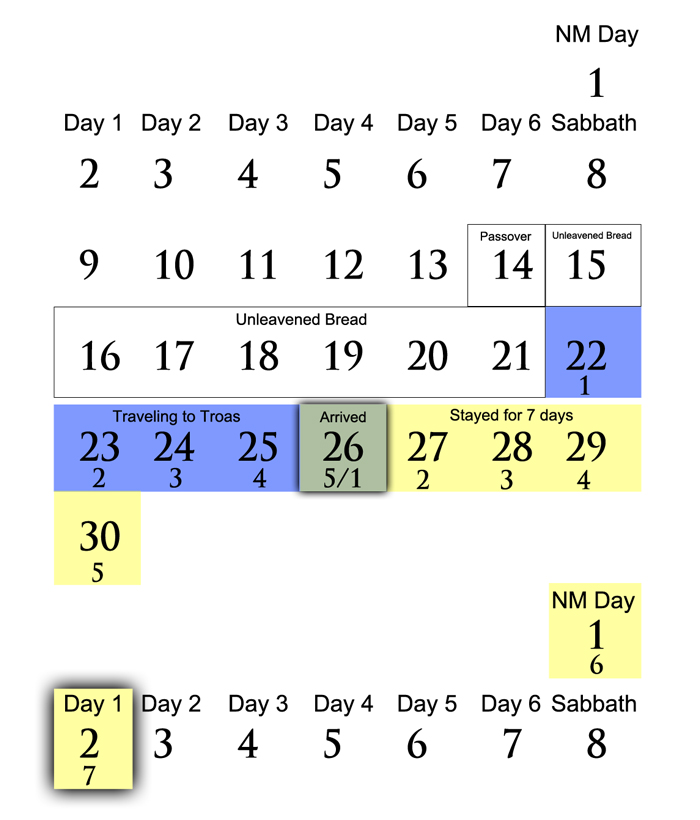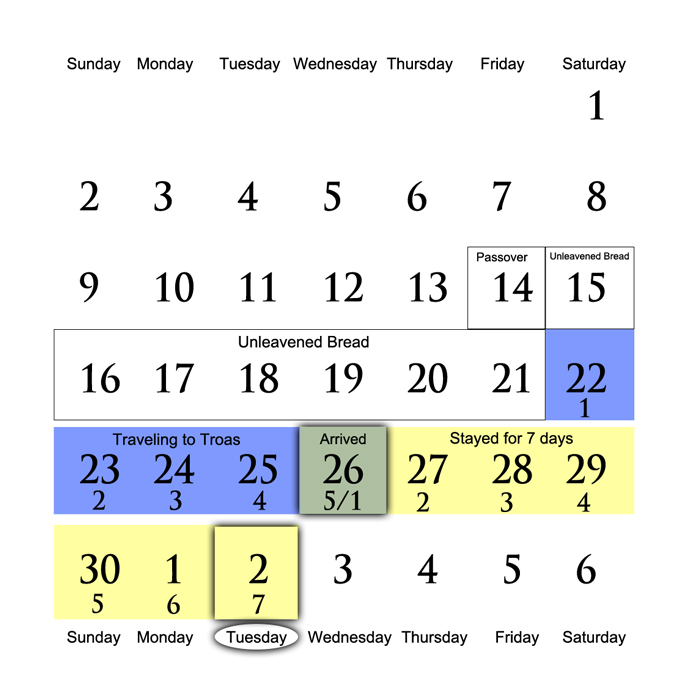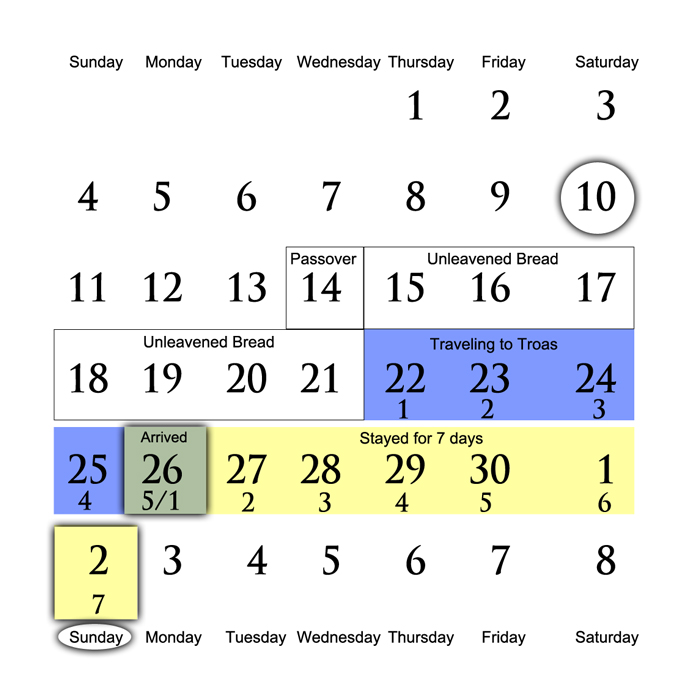

Question: How does Acts 20:5-7 show that Luke used a Luni-Solar calendar to record the details of Apostle Paul's traveling?
Answer:
"These going before tarried for us at Troas. And we sailed away from Philippi after the days of unleavened bread, and came unto them to Troas in five days; where we abode seven days. And upon the first day of the week, when the disciples came together to break bread, Paul preached unto them, ready to depart on the morrow; and continued his speech until midnight." (Acts 20:5-7)

Paul left "after the days of unleavened bread." The feast of Unleavened Bread ends on the 21st day of the first lunar month.1 He made it to Troas in five days. This places Paul's arrival in Troas on the 26th day2 of the month. Five Days: (1) 22nd; (2) 23rd; (3) 24th; (4) 25th; (5) 26th (Bear in mind that the 22nd was a Sabbath so Paul would have traveled at night.)
After reaching Troas, Paul stayed for seven days and met with the disciples on the "first day of the week." Seven Days: (1) 26th; (2) 27th; (3) 28th; (4) 29th; (5) 30th; (6) 1st [New Moon Day]; (7) 2nd [First Day of the Week]
The Biblical Luni-Solar Calendar is confirmed!
It is simply not possible to make this work with the modern Gregorian calendar and its continuous weekly cycle. Let's try it below:

Paul left "after the days of unleavened bread." The feast of Unleavened Bread ends on the 21st day of the first lunar month.1 He made it to Troas in five days. This places Paul's arrival in Troas on the 26th day2 of the month. Five Days: (1) 22nd; (2) 23rd; (3) 24th; (4) 25th; (5) 26th
After reaching Troas, Paul stayed for seven days and met with the disciples on the "first day of the week." Seven Days: (1) 26th; (2) 27th; (3) 28th; (4) 29th; (5) 30th; (6) 1st; (7) 2nd [Third Day of the Week]
Laying the papal Gregorian calendar over the Biblical narrative places Paul's meeting with the
disciples on the third day of the week,
not the first. Even if we were to suppose that the first month here was a 29-day month, Paul's meeting with the disciples would have fallen on the second day of the week. Again, it is simply not
possible to make this work with the modern Gregorian calendar and its
continuous weekly cycle.
Some have suggested that Passover and the Feast of Unleavened Bread are not fixed to specific days of the week. They say that Passover, in this scenario, must have fallen on a Wednesday - because this is the only way that Paul could have met with the disciples on the "first day of the week" (without abandoning the continuous weekly cycle paradigm).
Let us examine this proposed scenario:

Paul left "after the days of unleavened bread." The feast of Unleavened Bread ends on the 21st day of the first lunar month. He made it to Troas in five days. This places Paul's arrival in Troas on the 26th day of the month. Five Days: (1) 22nd; (2) 23rd; (3) 24th; (4) 25th; (5) 26th
After reaching Troas, Paul stayed for seven days and met with the disciples on the "first day of the week." Seven Days: (1) 26th; (2) 27th; (3) 28th; (4) 29th; (5) 30th; (6) 1st; (7) 2nd [First Day of the Week]
This scenario does place Paul's meeting with the disciples on the first day of the Gregorian planetary week. There is, however, a very clear problem here: the 10th day of the month falls on the seventh day of the Gregorian week - Saturday (here supposed by Gregorian calendar advocates to be the Sabbath). The 10th day of the first month cannot be a Sabbath, though, for this was the day that the children of Israel were to select their Passover lamb. This was a work day, a commerce day (not a Sabbath), because those who did not own a lamb had to purchase one on this day.
"Speak ye unto all the congregation of Israel, saying, In the tenth day of this month [the first month] they shall take to them every man a lamb, according to the house of their fathers, a lamb for an house . . . And ye shall keep it up until the fourteenth day of the same month: and the whole assembly of the congregation of Israel shall kill it in the evening." (Exodus 12:3-6)
Again, the proposed scenario here does not fit. Only the Luni-Solar Calendar, which restarts
the weekly count with each New Moon, successfully harmonizes all of the details
of Luke's narrative.
1 The Feast of Unleavened Bread is a seven day feast beginning on the 15th day of the first month (on the Sabbath, Passover being on the 6th day of the week). "In the fourteenth day of the first month at even is Yahuwah's Passover. And on the fifteenth day of the same month is the feast of unleavened bread unto Yahuwah: seven days ye must eat unleavened bread." (Leviticus 23:5-6)
(1st Day = 15th; 2nd Day = 16th; 3rd Day = 17th; 4th Day = 18th; 5th Day = 19th; 6th Day = 20th; 7th Day = 21st)
2 It could be argued that Paul actually left the night of the 21st, placing him in Troas on the 25th. This is a possibility, but does not disturb the Luni-Solar paradigm in the least. A 29-day month would still place Paul's meeting with the disciples on the "first day of the week." The modern Gregorian calendar, however, cannot be harmonized with the details of Paul's journey.